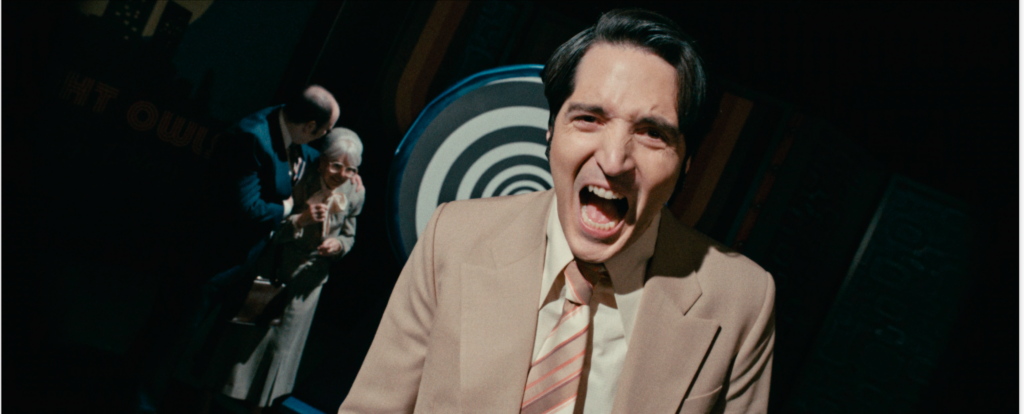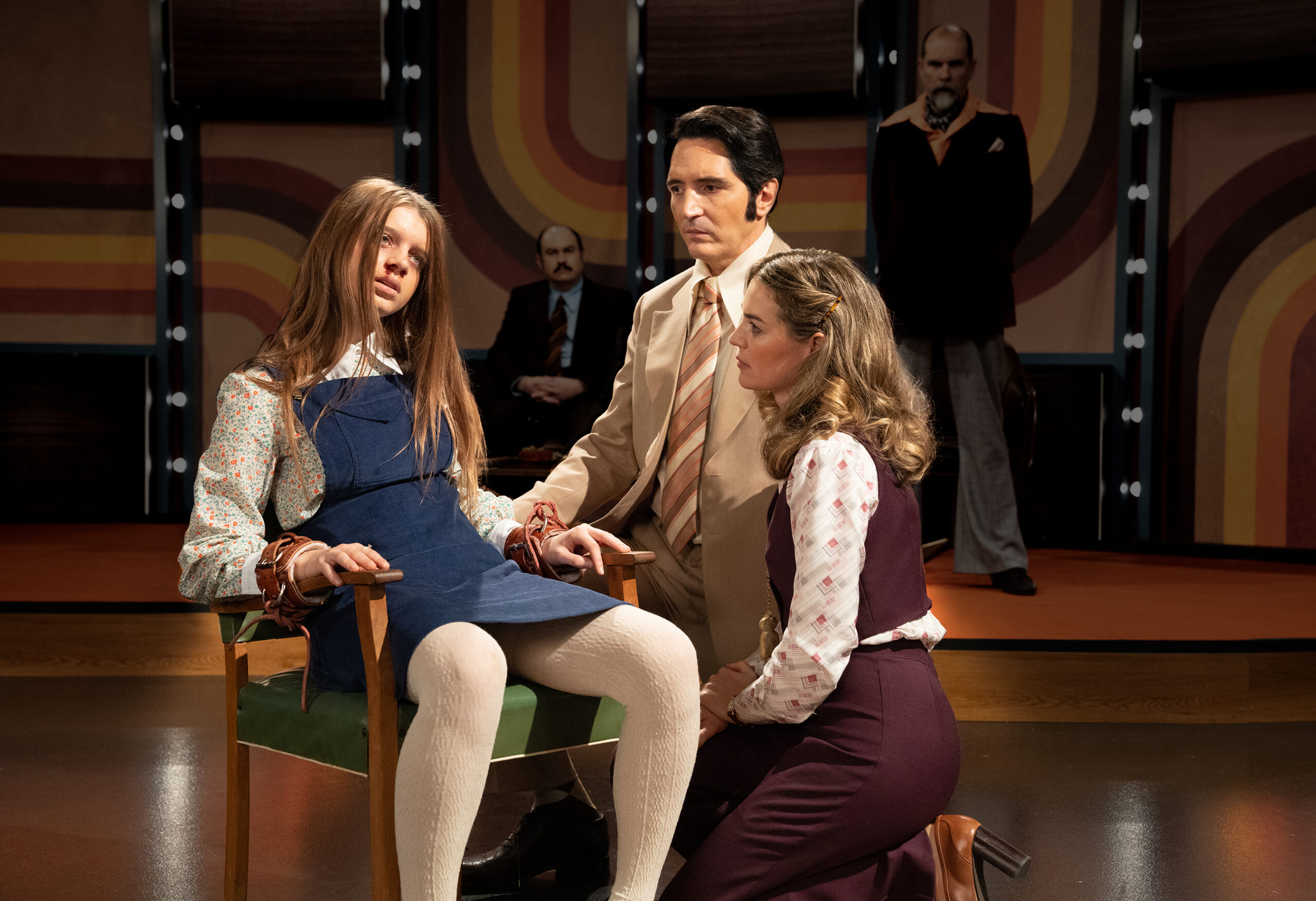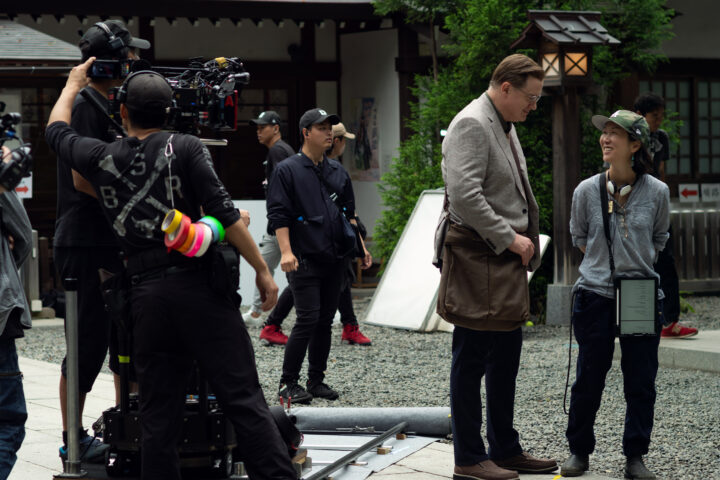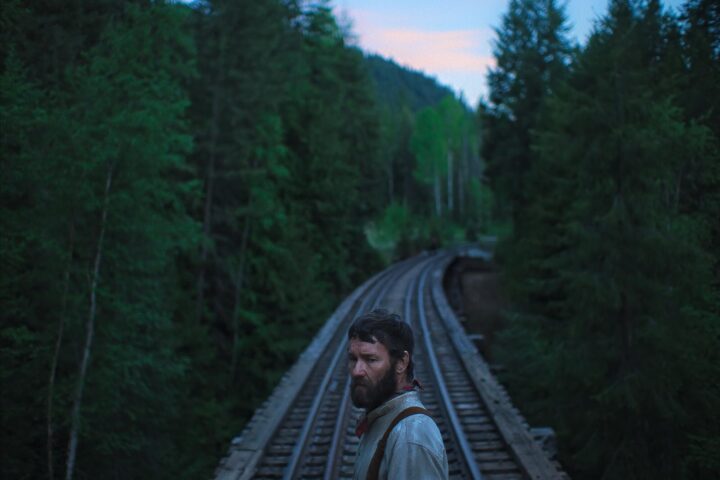In Late Night With the Devil, the found footage genre is resurrected for a clever, economical throwback thriller about cults, possession and a ratings-chasing, would be Johnny Carson in need of a “sweeps week” score to resurrect his failing show. Written and directed by Australian brothers Colin and Cameron Cairnes and starring the always dependable David Dastmalchian (who also produced), it is an ingenious mash-up of 70s media satire and occult horror that works, mainly due to its star’s broadly likable leading turn.
Set in 1977 and featuring a fetishistic recreation of a vintage television talk show set and format—replete with every shade of brown imaginable, right to its period wardrobe scheme—the picture is a real joy for anyone who lived through era, one piqued by post Manson Family-Jim Jones fears of cults and the rise of satanic panic, fostering rampant conspiracy theories and public fear over ritual abuse and demonic possession lurking to subvert bedrock American faith and vales.
Picture opens with an extended account of the rise and derailment of Night Owls host Jack Delroy (Dastmalchian), a fourth network fixture nipping at Carson’s heels for ratings but taking a Nielsen tumble after the untimely death of his beloved wife (Georgina Haig). This ambitious expository opener (narrated by Michael Ironside) details Delroy’s ascent from the doldrums of Berwyn, Illinois to major national TV fixture (and purported member of secret men’s society The Grove) whose show was abruptly canceled after a 1977 Halloween show debacle where something very, very bad happened live on-air.
We’re about to witness, we’re told, leaked found footage of Delroy’s infamous variety hour, which plunged its studio audience into the supernatural and shocked American homes. On this fateful evening, the show’s panel features Christou (Favssal Bazzi, having fun), a fraudulent medium whose encounter with genuine otherworldly phenomena violently disrupts his charade. Alongside him is debunker Carmichael the Conjurer (Ian Bliss), a skeptic armed with a hundred thousand dollar challenge for anyone who can prove their paranormal claims.

The ghoulish raison d’être of the panel is revealed on the arrival of mysterious adolescent Lilly, the lone survivor of a satanic suicide cult, portrayed with tactile ambiguity by Ingrid Torelli. Yet Lilly’s presence on the show is not merely a survivor’s tale; it harbors the potential for something more sinister—an insidious entity that may reside within her, known deceptively as Mr. Wriggles, reminiscent of the iconic Captain Howdy. The job of summoning this demonic presence falls to Lilly’s psychiatrist, Dr. June Ross-Michell (Laura Gordon), who cautions against coaxing Mr. Wriggles out via broadcast television during Night Owls‘ theater of the macabre. Bets on her warnings going unheeded?
Drawing from the well-worn yet enduring genre staple originated by Linda Blair’s portrayal of Regan MacNeil in The Exorcist, the film entertainingly navigates Lilly’s familiar terrain, a spectacle of practical and pyrotechnic effects. The final sequence brings down the house (and studio) with a big horror payoff. While the film isn’t truly scary, its wrap-up is a clever pivot blurring the line between reality and the supernatural. Within this narrative turn, Delroy’s cowardly ambitions unfold and, depending upon how you look at it, the devil himself just may emerge, a puppeteer demanding his grisly due.
The Cairnes brothers exhibit a mastery of 1970s American talk show nuances, evident not merely in the meticulous set design and art direction but also in the crowd interactions, on-stage guest dynamics and the polished, scripted banter of the hosts. With deliberate pacing, the film’s ninety-minute runtime resembles an authentic television episode, though this authenticity may resonate more profoundly in a home viewing setting rather than on the big screen, given the film’s vintage 1.33:1 aspect ratio. And I loved a climactic visual nod to Michele Soavi’s 1987 theatrical slasher Stage Fright.
Not flawless, Late Night With the Devil occasionally deviates from its established conventions. Despite the premise of witnessing shocking found footage, the narrative detours backstage during black-and-white commercial break sequences, raising questions regarding their origin and inclusion in the supposed found footage. Additionally, some supporting performances don’t quite equal Dastmalchian’s full-bodied lead.
Channeling the on-camera charisma of legends like Carson, Griffin, and Douglas, Dastmalchian’s Jack Delroy revives the era when network television was the hearth of American culture, hosting a parade of celebrities with tales that ranged from the promotional to the profoundly personal. With a deft touch, the actor stitches together Delroy’s behind-the-scenes struggles and on-air audience flair into a performance that’s both a tribute to TV’s golden age, a time when every late night promised unmissable television. Much to its star’s credit, Late Night With the Devil works chiefly because of his Delroy portrait—a savvy blend of ambition and artifice, his marvelously open face and arresting dark eyes first winking at the cultural winds of a bygone era before later, in film’s later moments, etching the cost of selling his soul.
3 stars



